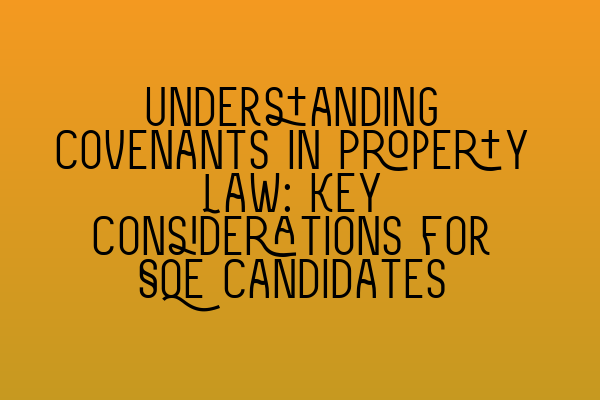Understanding Covenants in Property Law: Key Considerations for SQE Candidates
As a candidate preparing for the Solicitors Qualifying Examination (SQE) at SQE Property Law & Land Law, it is vital to have a solid understanding of various aspects of property law. One such aspect that warrants your attention is covenants. In this blog post, we will delve into the intricacies of covenants in property law and discuss key considerations that will help you excel in your SQE studies and future legal career.
But first, let’s clarify what a covenant is in the context of property law. A covenant is essentially a legally binding promise or agreement between parties related to the use or restriction of land or property. Covenants can be found in a variety of property-related transactions, including leases, conveyances, and transfers of land. Understanding the nature and significance of covenants is crucial in analyzing and advising clients on property matters.
Now, let’s explore some key considerations and concepts related to covenants that you should be familiar with:
1. Types of Covenants:
– Positive Covenants: Positive covenants require the performance of a specific action or obligation by the party bound by the covenant. For example, maintaining the property’s garden or contributing to the maintenance of shared facilities in a development.
– Restrictive Covenants: Restrictive covenants, on the other hand, place limitations or restrictions on the use of the property or land. These may include restrictions on building height, the type of activities that can be carried out on the premises, or the appearance of the property.
2. Enforceability of Covenants:
– Covenants may be enforceable between original parties involved in the transaction, such as the original seller and buyer.
– The burden of a restrictive covenant may be passed down to subsequent owners of the property, creating an enforceable obligation on them as well. However, for the burden of a positive covenant to run with the land, specific legal requirements must be met.
3. Remedies for Breach of Covenants:
– In case of a covenant breach, the injured party may seek various remedies, including damages, injunctions, or specific performance.
– The exact remedy available will depend on the circumstances, the type of covenant, and the jurisdiction in which the property is located.
4. Exceptions and Modifying Covenants:
– Some covenants may be unenforceable or modified by certain statutory provisions or court decisions. It is crucial to be familiar with these exceptions and understand their implications.
– For example, restrictive covenants may be deemed unenforceable if they are considered to be unreasonable or against public policy.
5. Registering and Searching for Covenants:
– It is essential to conduct thorough searches and investigations to identify any existing covenants that may affect the property in question.
– Searches can be conducted through various sources, such as the Land Registry, local authorities, and other relevant registries.
By comprehending these key considerations, you will be well on your way to mastering the complex area of covenants in property law. As an SQE candidate, it is important to stay updated on recent developments and case law related to covenants. Ongoing professional development will ensure that you have a robust understanding of this topic and can provide effective legal advice to your future clients.
To further enhance your SQE preparation, SQE Property Law & Land Law offers comprehensive SQE 1 and SQE 2 preparation courses. These courses provide invaluable guidance, practice resources, and mock exams to help you feel confident and prepared for the SQE exams.
If you’re looking for additional practice resources for the SQE 1 exam, check out our SQE 1 Practice Exam Questions. These quizzes will allow you to test your knowledge and identify areas that require further study.
For those focusing on SQE 2, we also offer SQE 2 Preparation Courses designed to equip you with the necessary skills and knowledge to excel in your exam.
Stay informed about SRA SQE Exam Dates to ensure you plan your study schedule effectively and have ample time for revision and preparation.
In conclusion, understanding covenants in property law is a crucial aspect of your SQE studies and future legal career. By grasping the types of covenants, their enforceability, remedies for breach, exceptions, and the importance of conducting thorough searches, you will be well-positioned to tackle questions related to covenants on the SQE exams and provide expert advice to your clients.
Remember, SQE Property Law & Land Law is here to support you throughout your SQE journey. Take advantage of our preparation courses, practice resources, and mock exams to enhance your knowledge and skills. Good luck with your studies!
